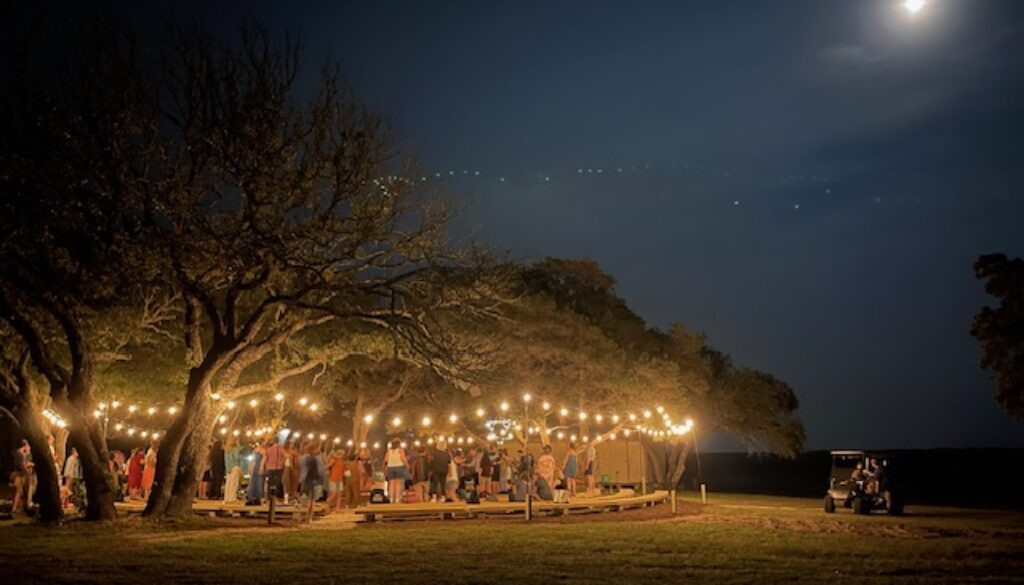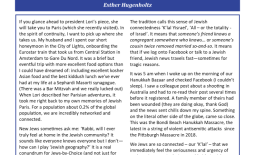Songs of Freedom
Try to imagine the environs: we are seated outside in a semi-circle of wooden benches, between the blending of the light of day and dusk, a campfire roaring in the center. Surrounding us is a small outcrop of trees, lights suspended across the branches. There is a small stage, more like a marked spot, where the musicians stand, a large Star of David made of twigs above their heads, also shot through with fairy lights. The setting is nothing short of magical as we usher in the evening prayers. Not traditional nor formulaic, but experiential, experimental and expansive. We are invited to focus on our breath, on the punctuation of silence among our song. We open with Elana Arian’s ‘T’filat haDerech’, the Traveler’s Prayer, led by the artist herself. The chorus is grand it its simplicity. Our voices blend in rousing ‘Amen, amen, amee-en, ame-e-en, v’imru amen.’ I feel the muscles in my body loosen; the tightness, the worry, the stress slowly melts away. My perspective is shifted. I feel love, and gratitude, hope and connectedness. The experience is positively transcendent.
What I am describing here is my time at the ‘Hava Nashira / Sing Unto God’ music conference. One hundred and twenty song leaders, musicians, cantors and rabbis gathered for four days to refresh their souls, learn new techniques, soak up new tunes and sing their lungs out. I felt like I had the VIP backstage passes to a remarkable Jewish music festival.
There was song everywhere we went. Song in the morning for Shacharit; song for Grace After Meals – the rowdy summer camp variety – after our three daily meals. Song in the evenings and in the late hours of the night. Song at the workshops and classes we took. I don’t think I’ve ever sung as much as this in my life, save perhaps the High Holiday season. And with every note, every beat, something loosened in all of us. Such is the remarkable power of song.
Song is an integral part of Judaism. In fact, it is so core to our tradition that there is no distinction between the word for ‘poem’ and the word for ‘song’: both are known as ‘shir.’ The oldest parts of the Hebrew Bible are, in fact, songs: Shirat haYam, the Song of the Sea may very well be the first Biblical text composed or committed to writing. Non-Jewish visitors are always struck by how much we sing or chant of the liturgy, even in a more traditional service. Song is woven into the B-Mitzvah experience, gifted under the wedding canopy and even accompanies our dead to their final resting place.
But what is the purpose of song? If you ask the Psalmist, it would be to cover the entire range of the human existential experience before the Ineffable Divine. If you ask the Rabbis, it would be how Creation was sung into being. If you ask Miriam the Prophetess, it would be to affirm redemption and freedom at the shores of the Sea of Reeds. And if we ask ourselves? How does music and song speak to our lives?
I contemplated what I would preach on tonight. Clearly, I wanted to share a snippet of my experiences of Hava Nashira—it seems only fitting! And, on the other hand, I did not want to miss the opportunity to craft a sermon on this week’s Torah portion, Parashat Behar. This portion is seen as the ultimate ‘freedom’ text, inscribed on the Liberty Bell: ‘freedom you shall proclaim throughout the land for all its inhabitants.’
How was I going to bring these two disparate ideas together?
Some of you may remember how this freedom is proclaim. It is not through whatever ancient Israelite equivalent might have been of the town crier, nor done by messengers on swift steeds, nor by writing on scrolls or tablets or pillars. It was proclaimed, rather, through music—the shofar to be exact. It is easy to make the connection between the proclamation of the Jubilee and Yom Kippur; the shofar image enhances that connection. We cherish the powerful blasts of the shofar. But perhaps less common is our imagiging or realization that the shofar was (and is) a musical instrument.
The shofar has a number of natural tones and a skilled player can play it like a bugle. I’ve heard ‘Oh When The Saints Come Marching In’ played on a shofar—it’s really quite amazing. Of course we know the shofar not just from the High Holidays, but also from that ultimate ‘musical psalm’, Psalm 150, where each instrument brings praise to God, including the shofar. Commenting on this proclamatory verse in our portion, Ibn Ezra, the Medieval commentator from Spain, notes that this Jubilee proclamation was undertaken by having a shofar blasted at ‘every street.’ This was not just one, centrally authorized shofar. It was a democratic cacophony of sound, of tones and harmonies, liberating the people publicly and collectively.
It is a powerful imagine. No, I promise that I won’t be blasting a shofar on the Pentacrest… and the theme of ‘liberation’ can take many directions. But in this time, perhaps what all of us need – irrespective of where we find ourselves – is an internal liberation, a loosening of the bonds that tie us down, a Jubilee of the soul where we get to press the re-set button, where we get to reimagine who we are through the creative power of music. Music speaks a language where words fail. It touches transcendence the way few theologies can. It unifies and uplifts with unimaginable power.
I hope this synagogue can be a place of many ‘shofarot’, in our seats, in every corner of this building. We all have a voice. We are all invited to sing in the great symphony of our redemption. This musical space is a judgment-free space, an open space, a welcoming space where you show up just the way God made you; imperfect, perhaps a little broken, and probably a little unsure. But it is yours. It is ours.
Over the months and probably the year, I hope to showcase more and more Hava Nashira tunes. I hope to learn these powerful melodies alongside with you all. I hope to empower more and more of you to make music with me, here on the bimah or elsewhere. I hope to continue to awaken in you the sheer exuberant joy of song.
Aly Halpert is one of the composers we got to learn about and enjoy. She wrote a spectacular tune to Ashrey, Psalm 145. I will close out by citing the lyrics, a mission statement if you will, of what music can bring to our lives on this Shabbat Behar:
‘𝐴𝑠ℎ𝑟𝑒𝑖 𝑦𝑜𝑠ℎ𝑣𝑒𝑖 𝑣𝑒𝑖𝑡𝑒𝑘ℎ𝑎
𝑜𝑑 𝑦𝑒ℎ𝑎𝑙𝑒𝑙𝑢𝑘ℎ𝑎 𝑠𝑒𝑙𝑎ℎ
I sing for you
I sing for what is holy and is true
I sing for all creation, for life and liberation
everyday anew.’
Let us lift our hearts and voices in song, for life and liberation. May the notes touch the deep parts in ourselves and set us free. Ken yehi ratzon, may this be God’s will.



